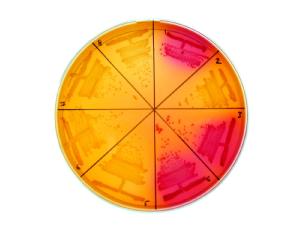David Grainger
phenotypes of bacterial cells on an agar plate
What got you interested in this area of science?
Growing up I had a general interest in "popular" science and this led to a particular focus on the sciences during my early schooling. As I got older, and subsequently began my university studies, I became more focused on the "life" sciences. Ultimately, I became fascinated by the field of "molecular biology". Molecular biology is the understanding of how cells function at the level of the molecules (for example DNA and proteins) from which they are made. This is a bit like taking apart a car and working out how each individual component contributes to the smooth running of the car.
How is the work you are currently doing relevant to everyday life?
Bacteria are the most abundant living organisms on the planet and influence everything from global warming and the planets ecosystems to food preservation. In particular, we are interested in learning how "pathogenic" bacteria (i.e. those bacteria that cause disease) function.
What does your research hope to achieve?
Research in my laboratory is focused on answering two questions. First, how do bacterial cells organise their DNA? This is an important issue because, just like an electrical cable or ball of string, DNA must be carefully wound up to avoid a tangled mess. Second, we want to understand how bacteria use their genes effectively. Most people are not aware that all cells, including their own, switch genes on and off according to their needs.
Briefly, what does the image show?
The image shows the bacterium E. coli growing on an agar plate. The colour of the bacteria in each section of the plate is different. This is because the genes present in some of the bacteria have been altered. In other words, they are mutants! Scientists can use this technique to rapidly "screen" thousands of mutated bacteria and determine which genes are important for which jobs.


